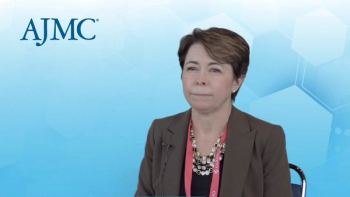
Susan Redline, MD, MPH, the SLEEP 2022 meeting keynote speaker, catalogued the evidence proving that continuous positive airway pressure (CPAP) does improve health outcomes—refuting a recent controversial report that claims otherwise.

Skylar is an associate editor for The American Journal of Managed Care® (AJMC®) and The Center for Biosimilars®, and joined AJMC® in 2020. She is responsible for covering all aspects of the ever-changing global biosimilar industry and produces content that is accessible and informative for all health care stakeholders.
She has a BA in journalism and media studies from Rutgers University. You can connect with Skylar on LinkedIn.

Susan Redline, MD, MPH, the SLEEP 2022 meeting keynote speaker, catalogued the evidence proving that continuous positive airway pressure (CPAP) does improve health outcomes—refuting a recent controversial report that claims otherwise.

A panel of experts at the SLEEP 2022 conference argued against considering race a risk factor for health complications and disrupted sleep, saying that being on the receiving end of racial discrimination is the true risk factor.

Posters from the SLEEP 2022 conference revealed some of the interaction between idiopathic hypersomnia and different aspects of life, including weight changes and interpersonal relationships.

Michael Ciarametaro, MBA, vice president of research at the National Pharmaceutical Council (NPC), explains the ways that the gene therapy market is working to address concerns regarding contractual riders for value-based contracts for expensive therapies.

The FDA approval for Fylnetra represents the fifth approval for a biosimilar referencing Neulasta (pegfilgrastim) in the United States.

Sharon Phares, PhD, MPH, chief scientific officer of the National Pharmaceutical Council, describes the lasting equity concerns regarding the use of health technology assessments (HTAs) for women.

Soumya Vishwanath, PharmD, senior manager of formulary management at Magellan Rx Management, explained what she wishes more people understood about digital therapeutics for behavioral health disorders.

Sharon Phares, PhD, MPH, chief scientific officer of the National Pharmaceutical Council, explained the importance of taking multiple factors into consideration when making health care decisions.

Marking Women's Health Month, Sharon Phares, PhD, MPH, chief scientific officer of the National Pharmaceutical Council, detailed how value assessments can address health care imbalances for women.

Black, Asian, and Hispanic adults in the United States were found to have an increased risk for developing diabetes at lower weights and younger ages compared with White Americans, suggesting that screening recommendations for the disease should be altered to reflect this difference.

Health plans and payers have plenty of options for how to analyze the effectiveness of digital therapeutic tools, as there are several effective strategies, according to Soumya Vishwanath, PharmD, of Magellan Rx Management.

Sharon Phares, PhD, MPH, discussed her new appointment as the chief scientific officer of the National Pharmaceutical Council (NPC) and her main priorities in honor of Women's Health Month.

Although crowdfunding can be a financial lifeline for young adult patients with serious medical conditions, the nuances regarding the need for and the long-term impact of crowdfunding exposes a facet of the US health care system that must be addressed.

Gillian Woollett, MA, Dphil, vice president and head of regulatory strategy and policy at Samsung Bioepis, gives insight into what international markets the United States could look to as examples of good biosimilar adoption.

Ryan Haumschild, PharmD, MS, MBA, from Emory Healthcare and Winship Cancer Institute, gives insight into how his practice will handle the influx of at least 7 adalimumab biosimilars referencing Humira that are expected to enter the market in 2023.

Michael Ciarametaro, MBA, vice president of research at the National Pharmaceutical Council, highlights steps clinics can take to mitigate issues related to data collection regarding cell and gene therapies.

Researchers found that implementing an incremental schedule for hemodialysis in patients with residual kidney disease produced similar clinical outcomes and significant savings for health systems compared with hemodialysis administered on a more traditional schedule.

Despite technological advancements, there are still many factors that can cause specimens for comprehensive genomic profiling (CGP) testing to become compromised, potentially leading to inaccurate prognostic results, according to a recent webinar.

Flow–minimal residual disease (MRD) assessment in patients with multiple myeloma (MM) was found to be a good tool for early detection of MRD and could aid providers in treatment decision-making.

A literature review outlined the number of fertility complications that men and women with chronic kidney disease (CKD) face as well as the list of potential factors that can impact fertility and sexual functions in this population.

A trastuzumab biosimilar was found to have similar safety and efficacy with the reference product (Herceptin) in patients with advanced gastric cancer, a population previously excluded from bioequivalence studies for trastuzumab biosimilars.

Chelsee Jensen, PharmD, pharmaceutical formulary manager at the Mayo Clinic, provides her take on why practices will have to continue to stock multiple biosimilars for the same reference product.

Ryan Haumschild, PharmD, MS, MBA, director of pharmacy services at Emory Healthcare and Winship Cancer Institute, explains how payers can play an essential role in improving biosimilar adoption.

Zahra Mahmoudjafari, PharmD, BCOP, clinical pharmacy manager at the University of Kansas Health System, gives her take on what payers should keep in mind when dealing with chimeric antigen receptor (CAR) T-cell therapies.

Pipeline forecasting can provide payers better insight into which expensive specialty drugs coming down the pipeline they should be keeping their eyes on, according to Katie Lockhart, MA, manager at Magellan Health.

Chelsee Jensen, PharmD, pharmaceutical formulary manager at Mayo Clinic, explains how the process of implementing biosimilars may differ depending on practice size.

Soumya Vishwanath, PharmD, senior manager of formulary strategy at Magellan Rx Management, highlighted the therapeutic gaps that need to be addressed to ensure that patients with behavioral health disorders are well cared for.

Jeffrey Casberg, vice president of pharmacy at IPD Analytics, discussed some of the regulatory and legal hurdles that generic and biosimilar companies have to face on the road to market launch.

Michael Ciarametaro, MBA, vice president of research at the National Pharmaceutical Council, discusses the balance between lowering drug prices and encouraging innovation in new drug classes for serious diseases.

A literature review pointed out the limited current research that has been conducted on how to manage pruritus in patients with chronic kidney disease (CKD) treated with hemodialysis, suggesting that more data is needed to improve symptom burden in these patients.

259 Prospect Plains Rd, Bldg H
Cranbury, NJ 08512
© 2025 MJH Life Sciences®
All rights reserved.
